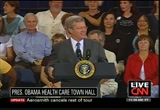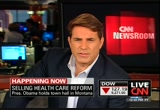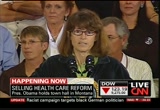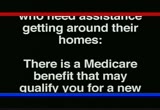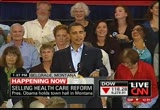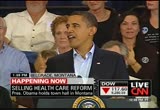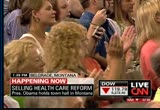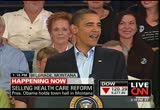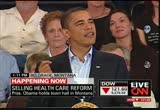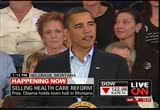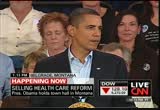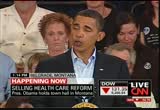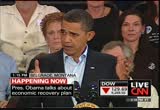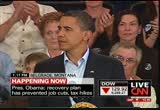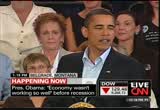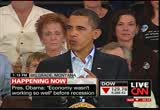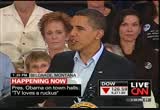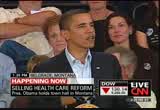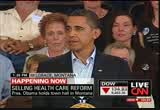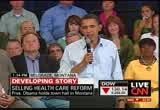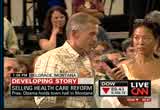tv CNN Newsroom CNN August 14, 2009 3:00pm-4:00pm EDT
3:00 pm
max baucus going to introduce the president. >> this is make or break for the president. this may be his moment to say, here is the truth. let's go ahead and listen in. you know, growing up here in montana, we learn values like hard work and common sense. we also learned the difference between right and wrong. it's just plain wrong for insurance companies to devalue coverage when you get sick and need it the most. [ applause ] >> it is just plain wrong for insurance companies to deny people care because of pre-existing conditions. that's why we are working so hard to kraft a common sense plan that is right for our state and right for america. here in montana, we also know the value of an honest word. let me tell you, there is plenty of dishonesty out there about
3:01 pm
what health care reform will or will not do. now, you've all seen the tv show, mythbusters, right? i have been going around the state busting myths about health care, whether it is bogus information about rationing care, cutting benefits for sen yu y yurs or interfering with the doctor/patient relationship. these myths are being busted right open. they are just plain balogna. that's why our president is here to talk with us and help us spread the truth about health care reform. it will lower costs. it will give -- make sure every american has access to quality affordable health care. [ applause ]
3:02 pm
in closing, i want to thank all of you, the people i work for, for coming out today, for getting engaged and taking the initiative to get involved. that is the cornerstone of our democracy. that is why our nation remains the greatest on earth. there you go. we are going to try and get that picture. it's almost like the interference you get from satellite when the signal starts to break up from the tranceponders. that's max baucus. it was interested what he was noting, their job is to be like the television show "myth death
3:03 pm
bust teres. we need to try and refute it. the question is, how directly will the president of the united states refute this information? it's expected that he might be a little more blunt than he has been in the past. now, let's listen in and see what happened. let's go ahead and go back to this. i will be here incase we lose the signal once again. >> i had chemotherapy, two kinds of radiation and five major surgeries. i was lucky enough to survive. i was also lucky to have excellent health insurance through my employer at the time, hewlett-packard. >> i don't know what to say. we are trying our darndest to make sure the signal is straightened out. that's a cancer survivor who was just introduced by max baucus who we believe is going to introduce the president. we are following this thing.
3:04 pm
it might be the most important town hall meeting that the president has given yet. supposedly, he may be somewhat more direct. really, take advantage of the bully pulpit and demythfy much of what has been said. we will get it straightened out. let's get the break in. we will come back in just two. stay with us. introducing the all new chevy equinox. with an epa estimated 32 miles per gallon. and up to 600 miles between fill ups. it's the most fuel efficient crossover on the highway. better than honda cr-v, toyota rav4 and even the ford escape hybrid. the all new chevy equinox. ...or if you're already sick... ...or if you lose your job.
3:05 pm
your health insurance shouldn't either. so let's fix health care. if everyone's covered, we can make health care as affordable as possible. and the words "pre-existing condition" become a thing of the past... we're america's health insurance companies. supporting bipartisan reform that congress can build on. ies who need assistance getting around their homes. there is a medicare benefit that may qualify you for a new power chair or scooter at little or no cost to you. imagine... one scooter or power chair that could improve your mobility and your life. one medicare benefit that, with private insurance, may entitle you to pay little to nothing to own it. one company that can make it all happen ... your power chair will be paid in full. the scooter store. hi i'm doug harrison. we're experts at getting you the power chair or scooter you need. in fact, if we qualify you for medicare reimbursement and medicare denies your claim, we'll give you your new power chair or scooter free.
3:06 pm
i didn't pay a penny out of pocket for my power chair. with help from the scooter store, medicare and my insurance covered it all. call the scooter store for free information today. call the number on your screen for free information. here we go, back to montana. the president of the united states is now entering the room. there seems to be a serious storm going through the area. that storm is causing the shot to break up somewhat. chad, before the president speaks, are you there? >> it is really just a rain
3:07 pm
shower. we are trying to shoot this satellite signal up to the satellite and down to us. it will be gone in literally two minutes. it will be gone. no problem. >> let's listen to the president. hello, montana. [ applause ] >> thank you, thank you, thank you. it's great to be here. everybody have a seat. thank you so much. thank you. i am excited to be back in montana. where is michelle? come on. what am i, chopped liver here? michelle and the girls were supposed to go white water rafting. now, i just heard some rain out there. so i don't know what's going on there but they are on their way.
3:08 pm
i want to, first of all, acknowledge some outstanding public officials and great friends. first of all, the man who is working tirelessly to make sure that the american people get a fair deal when it comes to health care in america, please give max baucus a big round of applause. [ applause ] . >> one of my favorite people in washington, probably because he hasn't gone washington, still gets the same hair cut, give it up for john tusom. [ applause ] >> your own star here in montana, the great governor of this state, please give brian
3:09 pm
schweitzer and his lovely wife, nancy, a big round of applause. [ applause ] >> the lieutenant governor, john bolinge rechlt is here. give john a big round of applause. [ applause ] >> the mayor of belgrade, russ nelson, is here. the mayor, carl jacobson is here and somebody who i believe is destined to be one of the greatest secretaries of the interior in our history, former senator from colorado, ken salazar is here. please give ken a big round of applause. it is nice to be back. it's nice to take a break from
3:10 pm
the goings on in washington. i am thrilled to have a chance to spend some time with the folks in this beautiful state. after all, here in montana, you have got bears and moose and elk. in washington, you just have mostly bulls. so this is a nice change of peace being in montana. i especially want to thank katy for her introduction. [ applau [ applau [ applause ] >> where did katy go? her willingness to talk about such a painful experience is important. we have to understand what's at stake in this health care
3:11 pm
debate. katy's story is the kind of story that i've read in letters all throughout the campaign and every day when i am president. i hear about them in town halls all across america. the stories of hard-working people who are doing the right thing. they are acting responsibly, only to find out that they are penalized because others aren't doing the right thing, because others aren't acting responsibly. on tuesday, i was in new hampshire talking about people denied insurance coverage because of pre-existing conditions. today, we are talking about folks like katy who have had their insurance policies suddenly revoked even though they were paying premiums, because of a medical condition. they got sick and suddenly rs that's when they get dropped. tomorrow, in colorado, we will be talking about the people who have insurance but are still stuck with huge bills, because they hit a cap on their benefits
3:12 pm
or they are charged exorbitant out-of-pocket fees. when you hear about these experiences and think of the millions of people denied coverage because of pre-existing conditions, when you think about the thousands who have their policies canceled each year like katy, i want to remember one thing. there, but for the grace of god, go i. most of us have insurance, and most of us think that we are going to stay healthy. we are no different than katy and other ordinary americans, no different than anybody else. we are held hostage at any given moment by health insurance companies that deny coverage or drop coverage or charge fees that people can't afford at a time when they desperately need care. it is wrong. it is bankrupting families,
3:13 pm
bankrupting business. we are going to fix it when we pass health insurance reform this year. we are going to fix it. again, i want to especially thank max for his hard work on a bill as chair of the finance commit at the. he has been committed to getting this done. this is obviously a tough time in america. it is a tough time here in montana. just six months ago, we were in the middle of the wore the recession in our lifetime. we were losing about 700 jobs each month. economists feared the great coming of a great depression. we acted as fast as we could to pass a recovery plan to stop the free-fall. i want to speak briefly about the recovery plan, because that has colored how people view the
3:14 pm
health care debate. the recovery plan was divided into three parts. one-third of the money in the recovery act went to tax cuts that have already started showing up in the paychecks of about 400,000 working families in montana. 400,000 working families have seen their taxes reduced because of receipt covery act. we cut taxes for small businesses. more have qualified for new loans including ten businesses in the bozeman area. another third of the money is for emergency relief for folks who have born the brunt of this recession. what am i talking about? unemployment insurance. we have extended benefits for 40,000 montana residents. we have made health insurance 65% cheaper for families who
3:15 pm
rely on cobra when they lose their job and they are out there looking for work. [ applause ] >> i think as your governor will testify, for states facing historic budget short falls, we provided assistance to save the jobs of tens of thousands of workers who provide essential services, like teachers and police officers. we have prevented painful job cuts. we have also prevented a lot of painful states and local tax increases. that's two thirds of the recovery act. the last third of the recovery act is for investments that are already putting people back to work, rebuilding infrastructure. there are nearly 70 transportation projects already approved here in montana. these are jobs fixing up the roads that run through the national forrest. good jobs doing the work that america needs done. most of the work is being done by local businesses. that's how we are going to get this economy growing again.
3:16 pm
there is no doubt that the recovery plan is doing what we said it would, putting us on the road to recovery. we saw last friday, the jobs picture is beginning to turn. we are starting to see science of business investments coming back. so people, i think, sometimes when i listen to them on tv or on these cable shows, they seem to have a selective memory. we started with this mess. we are now pulling out of it. that doesn't mean we are out of the woods. that doesn't mean we are out of the woods. boezman local job center reports 800,000 job seekers for 160,000 jobs. we can't sit back and do nothing while families are struggling. before this recession hit, we
3:17 pm
had an economy that was working well for the wealth thinkest americans and wall street bankers and it wasn't working so well for everybody else. it was an economy of bubbles and busts, an economy in which recklessness and not responsibility was rewarded. we can't go back to that kind of economy. if we want a country that succeeds in the 21st century, we have to lay a new foundation for lasting prosperity. health inshurngs refourance ref of the key pillars of this new foundation. this economy won't work for everyone until folks like katy and her husband can start that small business without fear of losing their health coverage. until companies aren't slashing payroll and losing profits to pay for health insurance, until every single american has the security and the peace of mind of knowing that they have got quality, affordable care. the fact is, health care touches
3:18 pm
all of our lives in a profound way. now, that also makes this debate an emotional one. i know there has been a lot of attention paid to some of the town hall meetings going on around the country, especially when tempers flare. tv loves a ruckus. what you haven't seen on tv and what makes me proud are the many constructive meetings going on all over the country? everywhere across the country, you are seeing people who are coming together and having a civil, honest, often difficult conversation about how we can improve the system. that's how democracy is supposed to work. earlier this week, i held a town hall in new hampshire. a few,000 people showed up. some were big supporters of health insurance reform. some had concerns and questions. some were downright skeptical, didn't believe it could be done.
3:19 pm
i was glad to see that people were there, not to shout. they were there to listen and ask questions. that reflects america a lot more than what we've seen covered on television for the last few days. i want to thank you for coming here today in that spirit. before i take questions, i just want to talk briefly when what health insurance reform will mean for you. we still have work to do in congress. bills aren't finalized. i want you to understand that about 80% of this has already been agreed to. here are the basic principles that folks are talking about. first, health insurance reform will mean a set of common sense, consumer protections for folks with health insurance. those of you who have health
3:20 pm
insurance, this is what it will mean. insurance companies will no longer be able to cancel your coverage because you get sick. that's what happened to katy. that can't happen anymore. if you do the responsible thing, if you pay your premiums so you are covered incase of a crisis, when that kras sis comes, if you have a heart attack or your husband finds out he has cancer or your son or daughter is rushed to the hospital, at the time when you are most vulnerable and most frightened, you can't be getting a phone call from your insurance company saying your insurance is revoked. it turns out once you got sick, they scoured your records looking for reasons to cancel your policy. they find a minor mistake on your insurance form that you submitted years ago. that can't be allowed to happen. one report found that three insurance companies alone had
3:21 pm
canceled 20,000 policies in this way over the past few years. one man in illinois lost his coverage in the middle of chemotherapy, because his insurer discovered he hadn't reported gallstones he didn't know about. true story. because his treatment was delayed, he died. a woman from texas was diagnosed with an aggressive form of breast cancer, was scheduled for a double mastectomy. three days before surgery, the insurance company canceled the policy, in part because she forgot to declare a case of acne. by the time the insurance was reinstated, the cancer had more than doubled insize. this is personal for me. i will never forget my own mother as she fought cancer, having to worry about whether the insurance company would refuse to pay for her treatment. the insurance company was arguing that she should have known that she had cancer when
3:22 pm
she took her new job even though it hadn't been diagnosed yet. if it could happen to her, it could happen to any one of us. it is wrong. when we pass health insurance reform, we are going to put a stop to it once and for all. that's what max baucus is working on. [ applau [ applause ] >> number two, insurance companies will be prohibited from denying coverage because of your medical history. a recent report found in that more than 12 million americans were discriminate td against because of a pre-existing condition. no one holds these companies accounted f accountable for these practices. they will not be able to place an arbitrary cap on the coverage
3:23 pm
you can receive in a lifetime. that will help 3,700 households in montana. we will place a limit on how much you can be charged for out-of-pocket expenses in america. no one in america should be broke when they get sick. finally, we'll require insurance companies to cover routine check ups and preventative care, like mammograms and colonoscopies, because that saves money and that saves lives. [ applause ] >> so that's what health care reform is all about. right now, we've got a health care system that all too often works better for the insurance companies than it does for the american people. we want to change that. now, if you are one of nearly 46 million people who don't have health insurance, you will finally have quality affordable options. if you do have health insurance, we will help make sure that your insurance is more affordable and more secure. if you like your health care
3:24 pm
plan, you can keep your health care plan. this is not some government takeover. if you like your doctor, you can keep seeing your doctor. this is important. i don't want government bureaucrats medaling in your health care. i also don't want insurance company bureaucrats meddling in your health care either. [ applause ] >> that's what reform is about. now, let me say this. under the proposals that max is working on, more than 100,000 middle class mon ttanans will g
3:25 pm
tax breaks and a marketplace to compare insurance options businesses will be helped by new tax benefits. we will do all this without adding to our deficit over the next decade, largely by cutting waste and ending sweet deals for insurance companies that don't make anybody any healthier. so the fact is we are closer to achieving health insurance reform than we have ever been in history. we have the american nurses association and the american medical association on board, because america's doctors and nurses know how badly we need reform. we have broad agreement in congress on about 80% of what we are trying to achieve. we continue to work on the other 20%. we have an agreement from the drug company who violently opposed reform in the past to
3:26 pm
make prescription drugs more affordable for seniors. the aarp supports this policy and agrees with us that reform must happen this year. but, because we are getting close, the fight is getting fierce. the history is clear. every time we are in sight of health insurance reform, the special interests fight back with everything we have got. they use their interest and ads and their political allies try to scare the heck out of everybody. it happened in '93. it is happening now. it happened by the way when lyndon johnson tried to propose medicare. it happened when john f. kennedy tried to propose medicare. we can't let them do it again, not this time. because for all the scare tactics out there, for all the scare tactics out there, what is truly scary, what's truly risky is if we do nothing. if we keep the system the way it
3:27 pm
is right now, we will continue to see 14,000 americans lose their health insurance every day. that could be you. premiums will continue to skyrocket, rising three times faster than wages. that will be you. the deficit will continue to grow. medicare will go into the red in less than a decade. so, for all the seniors out there who understandably are worried about medicare, if we don't reform the system, in eight years, medicare goes into the red. given the deficit we have right now, we have to start thinking, how are we going to pay for that. insurance companies will continue to profit by discriminating against people for being sick. so if you want a different future, a brighter future, i need your help. change is never easy, and, by the way, it never starts in washington.
3:28 pm
it starts with you. i need you to keep knocking on doors, talking to your neighbors, spread the facts, fight against the fear. this is not about politics. this is about helping the american people. if we can get it done this year, the american people are going to be better off. thank you, montana! thank you. everybody have a seat. so we are going to take as many questions as we can in the time we have got. we haven't preselected anybody or prescreened the questions. all we want to do is ask you to
3:29 pm
raise your hand if you have got a question. i am going to go girl, boy, girl, boy, so i don't get into trouble. there are people in the audience with microphones, as you can see. and so if you can -- once i call on you, if you can just wait until they bring the microphone, stand up so we can all see your lovely face and introduce yourself and then i will answer the question. if you can keep your questions relatively brief, i will try to keep my answers relatively brief. all right. this young lady right here in the blue blouse, right there. >> hi, mr. president. thank you so much for coming to southwest, montana. we really appreciate you being here. [ applause ] >> great to be here. >> my name is carol wilder. i was laid off in january. i am currently uninsured. my two children have medicaid right now. my question is, without going
3:30 pm
into too much detail, can you tell us what if you have kind of looked at canada, england's system and can you pick and choose from those systems that work that we see some success rate and apply that to what you are trying to push through right now? >> let me tell you what happens in other industrialized countries. first of all, it is important for everybody to understand that americans spend $5,000 to $6,000 per person more than any other advanced nation on earth. $5,000 or $6,000 more than any other country on earth. now, if you think, how request can that be? you probably don't notice it, because what is happening is, if you have got health insurance through your job, more and more of what would be your salary and wages is going to health
3:31 pm
insurance? you don't notice it. you just notice that you are not getting a raise. but a bigger and bigger portion of compensation is going to health care here in the united states. that's point number one. clearly, we have got a system that isn't as efficient as it should be, because we are not healthier than these people in these other countries. having said that, most other countries have some form of single payer system. there are differences, canada, and england have more of what's called -- what people, i guess, would call a socialized system in the sense that the government owns the hospitals, directly hires doctors. there are a whole bunch of countries like the net they are lands where what they do is, it is a single-payer system in the fact that government pays the bill but it is all private folks out there, private doctors and
3:32 pm
private facilities. there are a bunch of different ways of doing it. we need to come up with a uniquely american way of providing care. i am not in favor of canadian system. i am not in favor of a british system. i am not in favor of a french system. that's not what max is working on. every one of us, what we have said is, let's find a uniquely american solution, because, historically, here in the united states, the majority of people get their health insurance on the job. so let's build on that system that already exists. for us to completely change that, it would be too disruptive. that's where suddenly, people would loz what they have and they would have to adjust to an entirely new system. max and i agree, that's not the right way to go. all we have said is, in building a better system, what are the elements? number one, for people like you, you should be able to get some help going into the private
3:33 pm
insurance marketplace and buying health insurance. so we would give you a tax credit, a subsidy of some sort, to help you obtain insurance. the problem is, if you are going out there on your own, it is much more expensive than if you go in a big group. so we would allow you to buy into health care exchange that would give you some power to negotiate for a better rate, because you are now part of a big pool. we would also make sure that if you do have health insurance that you are protected from some of the policies that we've already talked about that have not been very good for consumers. so you wouldn't be able to be banned for pre-existing conditions, there be caps on the amount of out-of-pocket expenses you would have to spend wechlt would reform the insurance market for people who already have health insurance. and if we do those things, making it better for folks who already have insurance, making it easier for you to buy
3:34 pm
insurance and helping small businesses who want to do the right thing by their employees but just can't afford it because they are charged very high rates, they can't get a good deal from the insurance companies. if we do those things, then we can preserve the best of what our system offers, the innovation, the dynamism. that's what we are talking about with health care reform. when you start hearing people say, we are trying to get socialized medicine and have government bureaucrats meddle in your decision-making between you and your doctor, that's just not true. it's a guy's turn. the gentlemen in the back in the green.
3:35 pm
>> i think most of us know that medicare is one of the best social programs this nation has ever put together. [ applause ] >> it works extremely well and helps the people that need it the most. money doesn't grow on trees. how can we be insured that increasing coverage to others is not going to make medicare more expensive or less effective? >> i think this is a good point. i appreciate the question. a lot of seniors are concerned about this. first of all, it is important to know that medicare is a government program. so when you hear people saying, i hate government programs but keep your hands off my medicare, then there is ai little bit of a contradiction there. i have been hearing that quite a bit. i just want to be clear about that.
3:36 pm
medicare is a terrific program. it gives our seniors security. i want medicare to be there for the next generation, not just for this generation. if we don't make some changes in how the delivery system works, if we don't eliminate some of the waste and in efficiencies in the system, then seniors are really going to be vulnerable. what we have proposed is not to reduce benefits. benefits on medicare would stay the same. it is not to ration. we are asking to eliminate some of the practices that aren't making people healthier. example number one, subsidies to insurance companies under medicare amount to about $177 billion over ten years. that's how much we think we could save by eliminating subsidies to insurance companies that are offering what's called
3:37 pm
medicare advantage. it doesn't help seniors any more than regular medicare does. and so if we took that $177 billion, we're not making seniors worse off. we have that money now not only to strengthen the health care system overall but potentially to cover more people. now, the insurance companies don't like it but it's the right thing to do. let me give you another example of changes that we should make. right now, when you go into the hospital, you get a procedure under medicare. if you end up having to come back to that hospital a week later, because something went wrong, they didn't do it right, the hospital doesn't pay any penalty for that. they just get reimbursed for a second time or a third time. same fee, same service. now, think about that if auto
3:38 pm
repair shops operated the same way. you take your car in. you get it fixed. a week later, the thing is broken again. you go in. the guy says , well, let me charge you all over and i will do the same thing. that doesn't make sense. so what we have said is, let's give hospitals an incentive. let's say to the hospitals, we are going to charge you for overall treatment of whatever the problem is. if you get it right the first time, you get to keep a little extra money. if you keep on having the person coming back again and again, then there is a disincentive. those are examples of the kind of changes that can be made that aren't reductions in benefits but they save the system money overall and, by the way, will actually increase the life peck tansy of the medicare trust
3:39 pm
fund. as you said, money doesn't grow on trees. we are trying to preserve medicare and make people healthier in the process. all right. young lady in the back there, right there. i didn't see you. right there. the young lady in the blue who stood up there. >> good afternoon, mr. president. my name is sarah landry. i'm a bozeman, resident. i'm a little nervous. >> you are doing great. >> thank you. i'm a single mother of two children. i'm an msu student. i have a son that suffers from many disabilities. he is disabled for the rest of his life. he is 11 years old. he suffers from autism. he is nonverbal. he suffers from extremely hard
3:40 pm
to control ep lepcy and he is type one diabetic. he has been sick with these ailments ever since he was nine months old. my question to you is, i rely heavily on his medicaid to support good health care for him. what, with this reform, would happen with his medicaid coverage? >> first of all, thank you for sharing your story. you are a heroic mom. we are grateful to you and your son is lucky. if you currently qualify for medicaid, your son currently qualifies for medicaid, you would continue to qualify for medicaid. it would not have an impact on his benefit levels and his ability to get the care that he
3:41 pm
needs. some of the reforms that we are talking about, though, what i just referred to as delivery system reforms, where we help, for example, encourage doctors when they are seeing a patient, instead of having five tests, do one test and e-mail all the tests to five specialists. those kind of changes can save money in the medicaid and the medicare systems overall. that will actually help governor schweitzer be able to pay for it. we are not changing the benefit levels or who qualifies for medicaid. we might see some expansion of medicaid under the reforms that have been proposed in some of the legislation. we do have to make the whole system, overall, just a little
3:42 pm
bit smarter, make sure we are getting a better bang for the buck so that the money is there for the services that your son needs. this also includes, by the way, preventative care, wellness care? our system, really, i not a health care system? it's more like a disease care system. we wait until people get sick and then we provide them care. now, think about it. are we better off waiting until somebody gets diabetes and then paying a surgeon for a foot amputation or are we better off having somebody explain to a person who is obese and at risk of diabetes, to change their diet and if they contract diabetes to stay on their medications? obviously, the second is more cost efficient. right now, the health care system is per verse. it does not incentivize those
3:43 pm
things that make people better. that's where we have to change overall to make sure the resources are there for yourself. it's a gentlemen's turn. i am going to call on that gentlemen right there, right there. hold on, randy. there you go. >> my name is randy, rathy. as you can see, i'm a proud nra member. [ applause ] >> i believe in our constitution. it's a very important thing. i also get my news from the cable networks, because i don't like the spin that comes from them other places. >> you got to be careful about them cable networks. >> max baucus, our senator, has
3:44 pm
been locked up in a darkroom there for months now trying to come up with some money for these programs. we keep getting the bull. that's all we get, is bull. you can't tell us how you are going to pay for this. you are saving here, you are saving over there. you are going to take a little money here, take a little money there but you have no money. the only way you are going to get that money is to raise our taxes. you said you wouldn't. max baucus says he doesn't want to put a bill out that will but that's the only way you can do that. >> i'm happy to answer the question. >> thank you. >> look, you are absolutely right that i can't cover another 46 million people for free. you are right. i can't do that. so we're going to have to find some resources. if people who don't have health insurance are going to get some help, then we are going to have to find money from somewhere. now, what i've identified and
3:45 pm
most of the committees have identified and agreed to, including max baucus's committee is that overall, this bill will cost. let's say it costs 800 to $900 billion, that's a lot of money. that's a lot of money. that's over ten years, though. so that's about $80 billion to $90 billion a year. about two-thirds of it, two-thirds, can be attained by doing some of the things i have mentioned, eliminating subsidies to insurance companies. that's real money. i would rather be giving that money to the young lady here than giving it to insurance companies that are making record profits. now, you may disagree. i just think that's a good way to spend our money. but your point is well taken, because, even after we eliminate some of the waste and we've
3:46 pm
gotten those savings from within the health care system, that's only two-thirds. that still means we have to come up with one-third. that's about $30 billion a year. we have to come up with that. keep in mind, the numbers change partly because there are five different bims riglls right now. this is all going to get merged in september. let's assume it costs about $30 billion a year over ten years. we have to come up with that money. when i was campaigning, i maude a promise that i would not raise your taxes if you made $250,000 a year or less. that's what i said. but i said that for people like myself who make more than that, there is nothing wrong with me paying a little bit more in order to help people who got a little bit less. that was my commitment. so what i said is let's, for
3:47 pm
example, this is the solution that i originally proposed. some members in congress disagree. we are still working it through. what i said is, we could lower the itemized deductions i can take on my income tax returns every year so that instead of me getting 36%, 35% deductions, i will just get 28% like people who make less money than me. if i'm writing a check to my local church, i don't know why uncle sam should be giving me a bigger tax break than the person that makes less money than me, because that donation means just as much. if we did just that alone for people making more than $250,000, that alone would pay for the health care we are talking about. so my point is, my point is, number one, two-thirds of the money we can obtain just from eliminating waste and in
3:48 pm
efficiencies. the congressional budget office has agreed with that. this is not something i am making up. republicans don't dispute it. and then the other third, we would have to find additional revenue but it wouldn't come on the backs of the middle class. now, let me just make one final point. i know that there are some people who say, i don't care how much money somebody makes, they shouldn't have to pay higher taxes. i respect that opinion. i respect that view. but the truth of the matter is, that we've got to get over this notion that somehow we can have something for nothing, because that's part of how we got into the deficit and the debt that we're in in the first place. when the previous administration passed the prescription drug
3:49 pm
bill, that was something that a lot of seniors needed, right? they needed prescription drug help. the price tag on that was hundreds of billions of dollars. you know how we paid for it? we didn't. it just got added on to the deficit and the debt. so it amuses me sometimes when i hear some of the opponents of health care reform on the other side of the i'll or on these cable shows yelling with how we can't afford this when max and i are actually proposing to pay for it. they pass something they didn't pay for at all and left for future generations to have to pay in terms of debt. that doesn't make sense to me. can i say this, though, randy, i appreciate your question, the
3:50 pm
respectful way you asked it. by the way, i believe in the constitution too. so, thank you very much. appreciate it. right there in the green in the. yeah. yes, you. >> so, when funding dried up last fall due to the economic downturn, i lost my job in a nonprofit helping struggling teens. and i'd like to thank you because, because of your stimulus funding to community health clinics i now have a new job helping people who are mostly uninsured people with mental health. i'm a therapist. my name is evelyn rick, by the way. >> that's great. >> but there was a gap where i lost my insurance in between losing my job at the nonprofit and my current job. i'd like to ask you how you will help people with that gap when they're unemployed. >> well, first of all, the recovery package, the stimulus helps people precisely with that
3:51 pm
gap when we said we'll cover 65% of the cost of cobra. how many people here have been on cobra or tried to get on cobra? all right. so, just for those of you who aren't familiar with it, if you lose your job, under federal law you're able to access something called cobra which allows you to pay the premiums for health insurance that you had until you find your next job. sounds like a good deal. here's the only problem. as i said before, most of us don't realize how much our insurance costs our employers because we're not seeing the actual bill. we're seeing it paid mostly by our employers. so, when we lose our jobs, suddenly we get this bill for $1,000 or $1,200 or $1,500 a month and that's absolutely the worst time for you to have to come up with that money is when you've lost your job. so, what we did was we said because this is such an extraordinary crisis, let's take up 65% of that temporarily so
3:52 pm
that the huge numbers of people who have lost their jobs because of this financial downturn, they get a little bit more of a cushion. now, that was the initial help that we wanted to do to provide that bridge. when we passed health reform, you are going to be in a position where, first of all, you won't -- will be able to select it, a plan you can carry with you whether you've lost your job or not, and depending on your income level, you will also be qualified for a tax credit that will help you pay and continue your coverage even if you've lost your job. and far lor a lot of people -- is especially important far lot of people who are self-employed because increasingly, if you're a consultant, you're somebody who's opened up your own shop, a little mom and pop store somewhere, you are the people
3:53 pm
who have the toughest time getting insurance, because you just don't have enough employees for the insurance companies to take you seriously. that's why what we want to do is create an exchange, like a marketplace, where you can go and choose from a menu of different options, different kinds of plans that you think might be right for you. now, one of the options that's being debated and should there be a public option, all right, and i want to -- i want to just explain this briefly because this is where the whole myth of the government takeover of health care comes from, and not even every democrat agrees on the public option, but i just want at least people to be informed about what the debate is about. the idea is if you go to that marketplace and you're choosing from a bunch of different options, should one of the options be a government-run plan that still charges you premiums, you still have to pay for it
3:54 pm
just like private insurance, but government would not -- this government option would not have the same profit motive. it would be obviously like a not for profit. it would have potentially lower overhead so it might be able to give you a better deal. should you be able to choose from that option among many others. that's what the debate is about. now, what the opponents of the public option will argue is you can't have a level playing field if government gets into the business of providing health insurance, they will drive private insurers out of the health insurance market. that's the argument that's made. and i -- and that is a legitimate -- it's a fair concern, especially if the public option was being subsidized by taxpayers, right? i mean, if they could just keep on losing money and still stay in business after a while they would run everybody else out.
3:55 pm
and that's why any discussion of a public option has said that it's got to pay for itself, it's not subsidized by private insurers. the only point i want to make about this is whether you're for or against the public option, just understand that the public option is not a government takeover of health insurance. everybody here who still has -- who has currently private insurance, you know, you would more than likely still be on your private insurance plan. employers wouldn't stop suddenly providing health insurance. so, that is where this idea of government-run health care came from. it is not an accurate portrayal of the debate that's going on in washington right now. all right? it's a gentleman's turn. the gentleman right there. right there. yeah. yes, sir. >> thank you. given your comments regarding the public option, i would like, if you could, to comment on the
3:56 pm
following. and also, thank you and welcome. i believe in reform as well. i've learned that medicare pays about 94% hospital cost, and i've learned that medicaid pays 84% hospital cost. and i've learned this from a reputable source, my brother. he's a chief administrative officer at a large hospital group. he also explains to me when i communicate with him that private insurers, his hospital collects about 135% of cost from private insurers and that makes up the difference. so, if public option is out there, will it pay for its way or will it be underfunded like medicare and medicaid? thank you. >> it's a great question, and i'll try to be succinct on this. this is a complicated area. anybody who's ever gotten a bill from a hospital knows it's a complicated area. but here's the short answer. i believe that medicare
3:57 pm
should -- medicare and medicaid should not be obtaining savings just by squeezing providers. now, in some cases, we should change the delivery system so that providers have a better incentive to provide smarter care, right so, that they're treating the illness instead of just how many tests are done or how many mris are done or what have you, let's pay for curing the patient. but that's different from saying we need to save money so let's p cut pay to doctors by 10% and see if that helps out, because that's where you end up having the problem you're talking about. if they're only collecting 80 credibilities on the dollar, they have to make that up somewhere and they end up getting it from people who have private insurance. this is true, also, by the way, of emergency care. each of us spends, even though we don't know it, our employer pays for it so we don't notice
3:58 pm
it on our tab, each of us spend about $1,000 per family, maybe $900 per family paying for uncompensated care. people without health insurance going in, getting fixed up, that money comes from somewhere. well, it comes from you. you just don't see it on your bill. and so, if we can help provide coverage to people so that they're getting regular primary care and they're not going to the emergency room, we will obtain some savings, and that's pa partly, going to randy's earlier question, that's partly how we pay for giving other people health insurance. we already pay for it now, but we don't notice it. we pay for it in uncompensated care that is subsidized by the rest of us who have health insurance. all right. i only have a few more questions. i'm going to take two more
3:59 pm
questions. if i'm here, i have to call on somebody with a cowboy hat. absolutely. you've got a little flag on there. >> montana ambassadors. we're a business advisory group apointed by the governor. we've served three republican and two democratic governors, and i'd like to welcome you on behalf of the montana ambassadors. >> thank you so much. you make a great ambassador. >> thank you. my question, and i'm glad you called on me, has to do with the cobra question because i'm in the building materials business. i own a lumberyard in a beautiful little town of a thousand people about 40 miles southwest of here, ennis. and i was -- when the economy took a nosedive, i was forced to take my workforce from 11 people to six, and i'm one of, like most employers in america, i want to provide -- think it's my responsibility to provide health insurance, like to take care of
199 Views
IN COLLECTIONS
CNN Television Archive
Television Archive  Television Archive News Search Service
Television Archive News Search Service 
Uploaded by TV Archive on

 Live Music Archive
Live Music Archive Librivox Free Audio
Librivox Free Audio Metropolitan Museum
Metropolitan Museum Cleveland Museum of Art
Cleveland Museum of Art Internet Arcade
Internet Arcade Console Living Room
Console Living Room Books to Borrow
Books to Borrow Open Library
Open Library TV News
TV News Understanding 9/11
Understanding 9/11